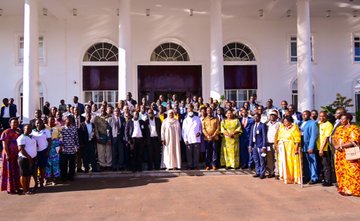
President Yoweri Kaguta Museveni has issued a strong warning against the exploitation of smallholder farmers as he signed the Sugarcane (Amendment) Bill, 2023, into law. He cautioned that households with less than four acres of land should not be lured into sugarcane cultivation, urging instead a focus on diversified farming to safeguard both household incomes and national food security.
Speaking at the signing ceremony held at State House, President Museveni highlighted the importance of strategic land use through his widely advocated 4-acre model, an approach designed to promote sustainable, income-generating agriculture at the household level.
’’If you want this industry to survive, there must be cooperation among all stakeholders,” the President warned. “Without it, sugar factories will collapse and when that happens, new farmers will have nowhere to sell their sugarcane. It is not just bad for the farmers; it is also detrimental to the processors themselves.”
’’It is equally wrong to mislead poor households particularly those with less than four acres into growing sugarcane,” he added. “Their focus should be on crops and enterprises that feed their families and provide stable income.’’
The President further emphasized his 4-acre model as a blueprint for household-level prosperity recommending one acre each for coffee, fruit cultivation, pasture for dairy farming, and staple food crops.
Additionally he encouraged smallholder farmers to engage in complementary activities such as poultry, piggery, and fish farming, especially in areas near wetlands, to enhance incomes and strengthen food security.
The Sugarcane (Amendment) Bill, 2023, passed by Parliament last month, introduces key reforms following extensive consultations with stakeholders, including farmers, millers, and MPs from major sugar-growing regions such as Buganda, Busoga, Bunyoro, and Acholi.
Among the reforms is a revamped structure of the Sugar Industry Stakeholders Council, a revised sugarcane pricing formula, and a new mechanism to fund council activities.
Hon Francis Mwebesa, Minister of Trade, Industry and Cooperatives, informed the President that the restructured Council is designed to provide broader and more equitable representation for all stakeholders in the sugar industry.
The new composition includes four farmer representatives, three miller representatives, and senior officials from the Ministries of Trade, Agriculture, and Finance. The Council will be chaired on a rotational basis by either a farmer or miller representative, with each term lasting two years.
“This structure ensures inclusivity of everyone and prevents domination by any one group,” Hon Mwebesa said. “The goal is to promote dialogue, transparency, and fair decision-making across the sector.”
To support the Council’s operations, the new law also establishes a Sugar Development Fund, financed through contributions from millers (70%) and out growers (30%).
President Museveni welcomed the provision requiring millers to share revenue not only from sugar but also from high-value by-products like ethanol and electricity.
“This is a good formula. I am now satisfied that farmers will benefit more fairly,” he said before signing the bill into law.
The signing ceremony was attended by key government officials, including Third Deputy Prime Minister Hon Rukia Nakadama, Minister for the Presidency Hon Babirye Milly Babalanda, and Minister of State for Trade (Industry) Hon David Bahati, as well as Members of Parliament and leaders of sugarcane growers’ associations from Buganda, Busoga, and Bunyoro.
By strengthening governance structures, ensuring fair revenue distribution, and promoting inclusive decision-making, the new law supports the country’s broader commitment to sustainable rural development.
As Uganda’s sugar industry moves toward a more transparent and equitable future, the government’s message resonates clearly, true economic progress must be inclusive and empower those at the grassroots.